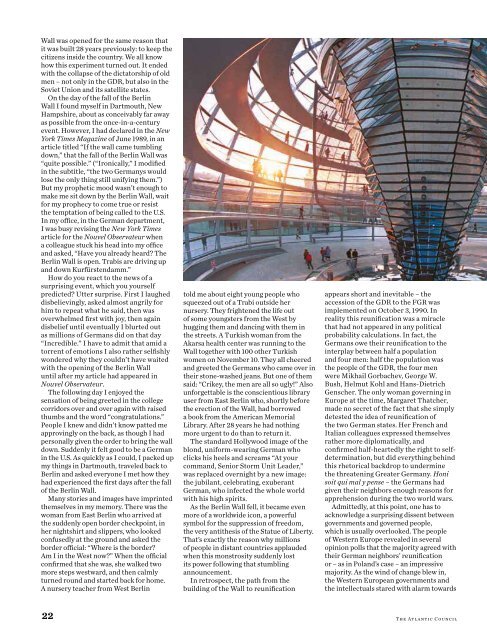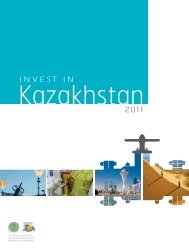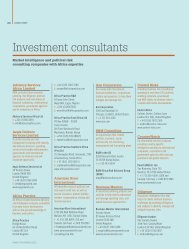NATO – A Bridge Across Time - Newsdesk Media
NATO – A Bridge Across Time - Newsdesk Media
NATO – A Bridge Across Time - Newsdesk Media
You also want an ePaper? Increase the reach of your titles
YUMPU automatically turns print PDFs into web optimized ePapers that Google loves.
Wall was opened for the same reason that<br />
it was built 28 years previously: to keep the<br />
citizens inside the country. We all know<br />
how this experiment turned out. It ended<br />
with the collapse of the dictatorship of old<br />
men <strong>–</strong> not only in the GDR, but also in the<br />
Soviet Union and its satellite states.<br />
On the day of the fall of the Berlin<br />
Wall I found myself in Dartmouth, New<br />
Hampshire, about as conceivably far away<br />
as possible from the once-in-a-century<br />
event. However, I had declared in the New<br />
York <strong>Time</strong>s Magazine of June 1989, in an<br />
article titled “If the wall came tumbling<br />
down,” that the fall of the Berlin Wall was<br />
“quite possible.” (“Ironically,” I modified<br />
in the subtitle, “the two Germanys would<br />
lose the only thing still unifying them.”)<br />
But my prophetic mood wasn’t enough to<br />
make me sit down by the Berlin Wall, wait<br />
for my prophecy to come true or resist<br />
the temptation of being called to the U.S.<br />
In my office, in the German department,<br />
I was busy revising the New York <strong>Time</strong>s<br />
article for the Nouvel Observateur when<br />
a colleague stuck his head into my office<br />
and asked, “Have you already heard? The<br />
Berlin Wall is open. Trabis are driving up<br />
and down Kurfürstendamm.”<br />
How do you react to the news of a<br />
surprising event, which you yourself<br />
predicted? Utter surprise. First I laughed<br />
disbelievingly, asked almost angrily for<br />
him to repeat what he said, then was<br />
overwhelmed first with joy, then again<br />
disbelief until eventually I blurted out<br />
as millions of Germans did on that day<br />
“Incredible.” I have to admit that amid a<br />
torrent of emotions I also rather selfishly<br />
wondered why they couldn’t have waited<br />
with the opening of the Berlin Wall<br />
until after my article had appeared in<br />
Nouvel Observateur.<br />
The following day I enjoyed the<br />
sensation of being greeted in the college<br />
corridors over and over again with raised<br />
thumbs and the word “congratulations.”<br />
People I knew and didn’t know patted me<br />
approvingly on the back, as though I had<br />
personally given the order to bring the wall<br />
down. Suddenly it felt good to be a German<br />
in the U.S. As quickly as I could, I packed up<br />
my things in Dartmouth, traveled back to<br />
Berlin and asked everyone I met how they<br />
had experienced the first days after the fall<br />
of the Berlin Wall.<br />
Many stories and images have imprinted<br />
themselves in my memory. There was the<br />
woman from East Berlin who arrived at<br />
the suddenly open border checkpoint, in<br />
her nightshirt and slippers, who looked<br />
confusedly at the ground and asked the<br />
border official: “Where is the border?<br />
Am I in the West now?” When the official<br />
confirmed that she was, she walked two<br />
more steps westward, and then calmly<br />
turned round and started back for home.<br />
A nursery teacher from West Berlin<br />
told me about eight young people who<br />
squeezed out of a Trabi outside her<br />
nursery. They frightened the life out<br />
of some youngsters from the West by<br />
hugging them and dancing with them in<br />
the streets. A Turkish woman from the<br />
Akarsa health center was running to the<br />
Wall together with 100 other Turkish<br />
women on November 10. They all cheered<br />
and greeted the Germans who came over in<br />
their stone-washed jeans. But one of them<br />
said: “Crikey, the men are all so ugly!” Also<br />
unforgettable is the conscientious library<br />
user from East Berlin who, shortly before<br />
the erection of the Wall, had borrowed<br />
a book from the American Memorial<br />
Library. After 28 years he had nothing<br />
more urgent to do than to return it.<br />
The standard Hollywood image of the<br />
blond, uniform-wearing German who<br />
clicks his heels and screams “At your<br />
command, Senior Storm Unit Leader,”<br />
was replaced overnight by a new image:<br />
the jubilant, celebrating, exuberant<br />
German, who infected the whole world<br />
with his high spirits.<br />
As the Berlin Wall fell, it became even<br />
more of a worldwide icon, a powerful<br />
symbol for the suppression of freedom,<br />
the very antithesis of the Statue of Liberty.<br />
That’s exactly the reason why millions<br />
of people in distant countries applauded<br />
when this monstrosity suddenly lost<br />
its power following that stumbling<br />
announcement.<br />
In retrospect, the path from the<br />
building of the Wall to reunification<br />
appears short and inevitable <strong>–</strong> the<br />
accession of the GDR to the FGR was<br />
implemented on October 3, 1990. In<br />
reality this reunification was a miracle<br />
that had not appeared in any political<br />
probability calculations. In fact, the<br />
Germans owe their reunification to the<br />
interplay between half a population<br />
and four men: half the population was<br />
the people of the GDR, the four men<br />
were Mikhail Gorbachev, George W.<br />
Bush, Helmut Kohl and Hans-Dietrich<br />
Genscher. The only woman governing in<br />
Europe at the time, Margaret Thatcher,<br />
made no secret of the fact that she simply<br />
detested the idea of reunification of<br />
the two German states. Her French and<br />
Italian colleagues expressed themselves<br />
rather more diplomatically, and<br />
confirmed half-heartedly the right to selfdetermination,<br />
but did everything behind<br />
this rhetorical backdrop to undermine<br />
the threatening Greater Germany. Honi<br />
soit qui mal y pense <strong>–</strong> the Germans had<br />
given their neighbors enough reasons for<br />
apprehension during the two world wars.<br />
Admittedly, at this point, one has to<br />
acknowledge a surprising dissent between<br />
governments and governed people,<br />
which is usually overlooked. The people<br />
of Western Europe revealed in several<br />
opinion polls that the majority agreed with<br />
their German neighbors’ reunification<br />
or <strong>–</strong> as in Poland’s case <strong>–</strong> an impressive<br />
majority. As the wind of change blew in,<br />
the Western European governments and<br />
the intellectuals stared with alarm towards<br />
22 The Atlantic Council







